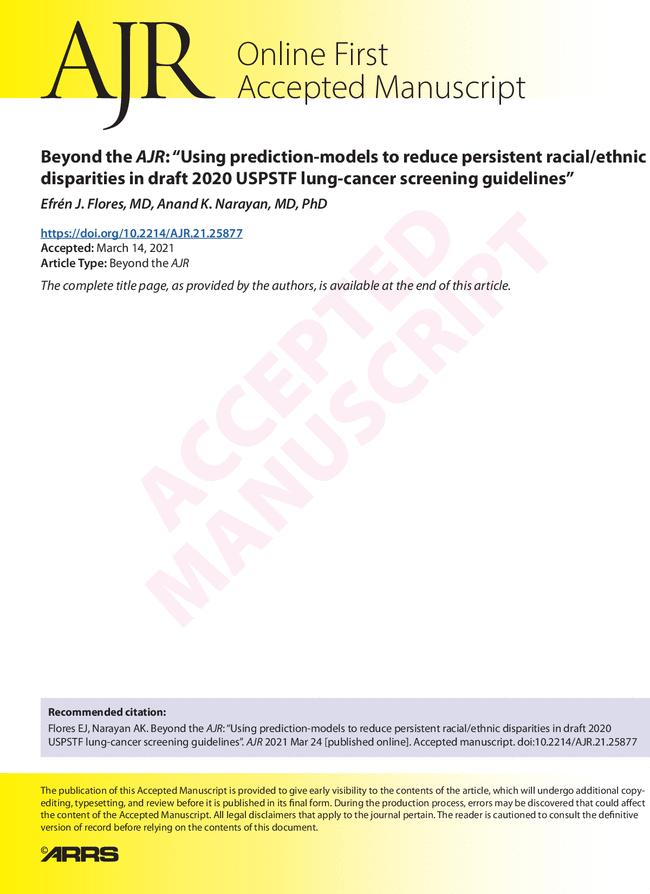Updated USPSTF LCS guidelines based solely on age, pack-years, and quit-years perpetuate eligibility disparities among racial and ethnic minorities, although incorporating certain risk prediction models may help reduce such inequalities

Credit: American Roentgen Ray Society (ARRS), American Journal of Roentgenology (AJR)
Leesburg, VA, March 26, 2021–According to ARRS’ American Journal of Roentgenology (AJR), updated United States Preventive Services Task Force (USPSTF) lung cancer screening (LCS) guidelines based solely on age, pack-years, and quit-years perpetuate eligibility disparities among racial and ethnic minorities, although incorporating certain risk prediction models may help reduce such inequalities.
By pulling data from the 2015 National Health Interview Survey (NHIS), Journal of the National Cancer Institute researchers (Landy et al.) were able to “estimate the effects of USPSTF-2020 guidelines on disparities in LCS eligibility for the non-institutionalized civilian US population,” wrote Massachusetts General Hospital radiologists Efrén J. Flores and Anand K. Narayan in their AJR critique. In connecting this NHIS dataset to the National Death Index, the original researchers were able to not only estimate eligibility but also model any possible effects of guideline changes on preventable lung cancer deaths.
“However,” Flores and Narayan contended, “by modeling the effects of changes instead of measuring actual outcomes, the authors’ conclusions that LCS disparities can be nearly eliminated by using alternative eligibility criteria reflects an aspirational goal.” In fact, updated criteria must be used alongside outreach efforts to ensure equitable access and appropriate follow-up.
To define eligibility based on individual risk as well as life expectancy, Landy et al. used the Life-Years From Screening-CT (LYFS-CT) model, despite the fact that life expectancy may limit access for minorities who have shorter life expectancies. Moreover, the initial investigators assumed that LCS would reduce lung cancer mortality by 20% for all racial and ethnic groups, even though previous studies have suggested that minorities may experience greater reductions in lung cancer mortality from LCS.
Ultimately, because LYFS-CT may exclude minority patients who could benefit from LCS and underestimate the benefits of LCS, the authors of this AJR article suggested “augmenting LCS eligibility for minority patients using combinations of models”–specifically, the PLCOm2012 model in conjunction with LYFS-CT and USPSTF-2020.
###
Founded in 1900, the American Roentgen Ray Society (ARRS) is the first and oldest radiological society in North America, dedicated to the advancement of medicine through the profession of radiology and its allied sciences. An international forum for progress in medical imaging since the discovery of the x-ray, ARRS maintains its mission of improving health through a community committed to advancing knowledge and skills with an annual scientific meeting, monthly publication of the peer-reviewed American Journal of Roentgenology (AJR), quarterly issues of InPractice magazine, AJR Live Webinars and Podcasts, topical symposia, print and online educational materials, as well as awarding scholarships via The Roentgen Fund®.
Media Contact
Logan K. Young
[email protected]
Related Journal Article
http://dx.




